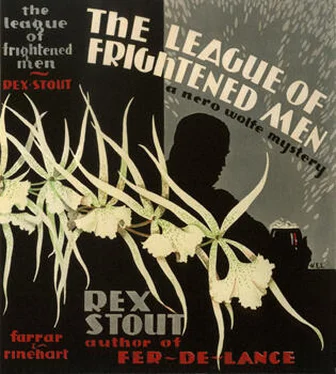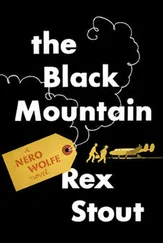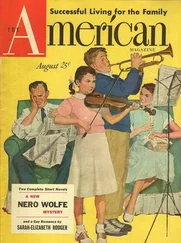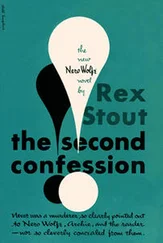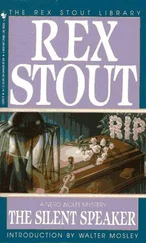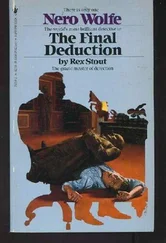“I thought so. Forget Dreyer?”
“Let him rest in peace. At least for tomorrow.”
“A thousand dicks and fifteen thousand cops have been looking for Hibbard for eight days. Where shall I bring him when I find him?”
“If alive, here. If dead, he will care as little as I. But his niece will care, I presume, to her.”
“Do you tell me where to look?”
“Our little globe.”
“Okay.”
I went upstairs. I was riled. We had never had a case, and I suppose never will have, without Wolfe getting cryptic about it sooner or later; I was used to it and expected it, but it always riled me. In the Fairmont-Avery thing he had deliberately waited for twenty-four hours to close in on Pete Avery after he had him completely sewed up, just for the pleasure of watching me and Dick Morley of the D.A.’s office play fox-and-goose with that old fool that couldn’t find his ear trumpet. I suppose his awful conceit was one of the wheels that worked the machinery that got his results, but that didn’t make it any more enjoyable when I was doing the worrying for both of us. That Wednesday night I nearly took the enamel off of my teeth with the brush, stabbing with it at Wolfe’s conceit.
The next morning, Thursday, I had had my breakfast and was in the office by eight o’clock, taking another good look at the photograph of her uncle which Evelyn Hibbard had given to us. Saul Panzer had phoned and I had told him to meet me in the McAlpin lobby at eight-thirty. After I had soaked in all I could of the photograph I made a couple of phone calls, one to Evelyn Hibbard and one to Inspector Cramer. Cramer was friendly. He said that on Hibbard he had spread the net pretty wide. If a body of a man was washed up on the sand at Montauk Point, or found in a coal mine at Scranton, or smelled in a trunk in a Village roominghouse, or pulled out of a turnip pit in south Jersey, he would know about it in ten minutes, and would be asking for specifications. That satisfied me that there was no sense in my wasting time or shoe leather looking for a dead Hibbard; I’d better concentrate on the possibility of a live one.
I went to the McAlpin and talked it over with Saul Panzer. He, with his wrinkled little mug not causing any stranger to suspect how cute he was, and he could be pretty damn cute — he sat on the edge of a tapestry chair, smoking a big slick light-brown cigar that smelled like something they scatter on lawns in the early spring, and told me about it to date. It was obvious from the instructions Saul had been following, either that Wolfe had reached the same conclusion that I had, that if Hibbard had been croaked the police routine was the best and quickest way of finding him, or that Wolfe thought Hibbard was still alive. Saul had been digging up every connection Hibbard had had in and around the city for the past five years, every degree of intimacy, man, woman, and child, and calling on them. Since Hibbard had been an instructor at a large university, and also a sociable man, Saul hadn’t made much more than a start. I supposed that Wolfe’s idea was that there was a possibility that Chapin’s third warning was a fake, that Hibbard had just got too scared to breathe and had run off to hide, and that in that case he was practically certain to get in touch with someone he knew.
My heart wasn’t really in it. For my part, I believed the cripple, third warning and all. In the first place, Wolfe hadn’t said definitely that he didn’t; and secondly, I had known Wolfe to be wrong, not often, but more than once. When the event proved that he had been wrong about something, it was a delight to see him handle it. He would wiggle his finger a little more rapidly and violently than usual, and mutter with his eyes nearly open at me, “Archie, I love to make a mistake, to assume the burden of omniscience.”
But although I believed the cripple and was perfectly comfortable with the notion that Hibbard wasn’t using up any more air, I couldn’t see that there was anything better to be done than to smell around places where he had once been alive. I left the general list — neighbors, friends, pupils and miscellaneous — to Saul, and chose for myself the members of the League of the White Feather.
The Tribune office was only seven blocks away, so I called there first, but Mike Ayers wasn’t in. Next I went up on Park Avenue, to Drummond’s florist shop, and the little fat tenor was all ready for a talk. He wanted to know many things, and I hope he believed what I told him, but he had nothing to offer in exchange that helped me any. From there I went back down to Thirty-ninth Street to see Edwin Robert Byron the editor, and that was also empty. For over half an hour about all he found time for was “Excuse me” as he was reaching for the telephone. I was thinking, with all that practice, if he should happen to get fired as an editor he could step right in anywhere as a telephone girl.
When I was out working I was supposed to phone in at eleven o’clock, at which time Wolfe got down from the plant-rooms, to ask if there were any new instructions. Leaving Edwin Robert Byron’s office a little before eleven, I decided I might as well roll over to the house in person, since it was only a couple of blocks out of my way to the next call.
Wolfe wasn’t down yet. I went to the kitchen and asked Fritz if anyone had left a corpse on the stoop for us, and he said he didn’t think so. I heard the elevator and went to the office.
Wolfe was in one of his sighing moods. He sighed as he said good morning and he sighed as he got into his chair. It might have meant anything from one measly little orchid getting bugs on it up to a major relapse. I waited until he got his little routine chores done before trying to pass a couple of words.
Out of one of the envelopes in the morning mail he took some pieces of paper that looked familiar from where I stood. I approached. Wolfe looked up at me and back at the papers.
I asked, “What’s that, Farrell’s second edition?”
He handed me one of the sheets, a different size from the others. I read it:
Dear Mr. Wolfe:
Here are two more samples which I failed to deliver with the others. I found them in another pocket. I am called suddenly to Philadelphia on a chance at a commission, and am mailing them to you so you will have them first thing in the morning.
Sincerely,
Augustus Farrell
Wolfe had already got his magnifying glass and was inspecting one of the samples. I felt my blood coming up to my head, which meant a hunch. I told myself to hang onto the aplomb, that there was no more reason to expect it of these than of the others, and there were only two chances. I stood and watched Wolfe. After a little he pushed the sheet aside and shook his head, and reached for the other one.
One more, I thought. If it’s that one he’s got one of his facts. I looked for an expression on his face as he examined it, but of course I might as well have saved my eyes the strain. He moved the glass along, intent, but a little too rapidly for me not to suspect that he had had a hunch too. At length he looked up at me, and sighed.
“No.”
I demanded, “You mean it’s not it?”
“No, I believe, is negative. No.”
“Let me see the damn things.”
He pushed them across and I got the glass and gave them a look. I didn’t need to be very thorough, after the practice I had had the night before. I was really almost incredulous, and sore as the devil, because in the detective business nothing is more important than to find your hunches good as often as possible. If you once get off of your hunches you might as well give up and go and get a job on the Homicide Squad. Not to mention that Wolfe had said that that typewriter was one of the two things he needed.
Читать дальше
